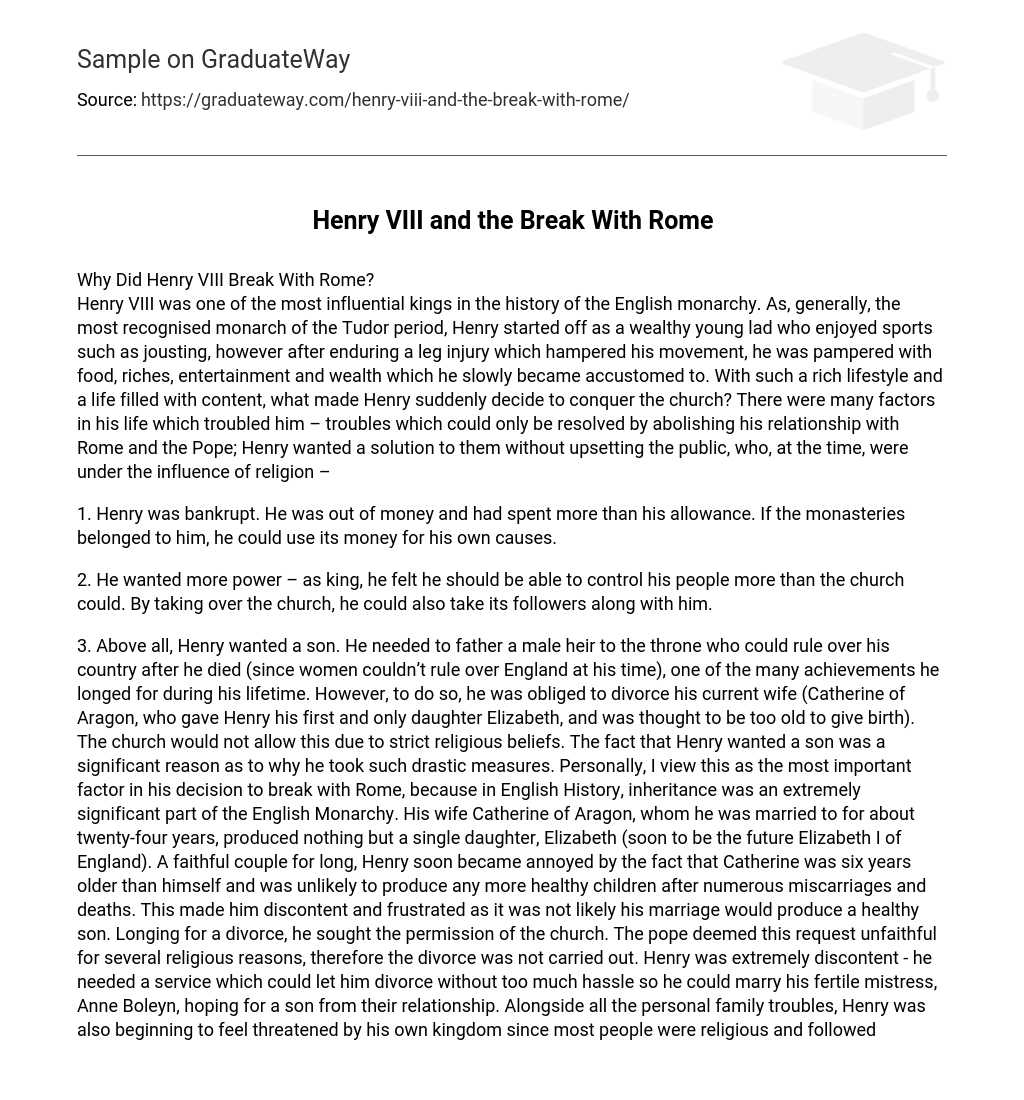Why Did Henry VIII Break With Rome?
Henry VIII, the influential king of the English monarchy during the Tudor period, initially enjoyed sports like jousting. However, a leg injury limited his mobility and led to indulgence in food, wealth, entertainment, and luxury. Despite his comfortable lifestyle, something troubled Henry enough to challenge the authority of the church without upsetting the religiously influential public. Consequently, he chose to sever ties with Rome and the Pope.
1. Henry found himself in financial ruin, having expended his allowance and falling into bankruptcy. He pondered the potential use of monastery funds, should they become his possession, to aid his personal causes.
The king wanted more power and felt he should have more control over his people in comparison to the church. By taking charge of the church, he could also influence its followers.
Henry’s ultimate goal was to have a son who could succeed him as ruler of England, but he needed to end his marriage with Catherine of Aragon in order to achieve this. Catherine had only given him a daughter and was believed to be unable to have more children due to her age. However, the church’s strict religious beliefs prevented Henry from obtaining a divorce.
The significance of Henry’s desire for a son played a major role in his decision to break with Rome since inheritance was crucial in English history. Despite being married to Catherine for many years, Henry grew frustrated with her age and inability to produce healthy children, leading him to seek a divorce. The pope denied his request for religious reasons, thus preventing the divorce from happening.
Feeling discontent and desiring an easier divorce process, Henry sought a service that would allow him to marry his mistress, Anne Boleyn, with hopes of conceiving a son. Alongside his personal family issues, Henry started seeing his kingdom as a threat because most people were religious and loyal o the church’s authority. Though he did not strongly detest the church members he believed that their power over the people overshadowed his own influence.
Anxiety and fear filled Henry as he anticipated the public’s future actions, particularly rebellions and uproar. Power struggles between the king and the Church caused disputes to arise. In response, Henry decided that he needed to control the Church within his own country, asserting his authority as ruler. Meanwhile, financial troubles and health issues arose due to Henry’s extravagant lifestyle. Conversely, the Church continued to attract followers, which influenced Henry in his decision-making process. Additionally, Henry urgently required financial support for his campaigns and living expenses. To address this need, he devised a plan to seize control of monasteries and appointed himself as head of the Church with hopes of minimizing public backlash. From 1536-39, Henry and his ministers meticulously inspected monasteries throughout the nation for weaknesses and evidence against the Church’s practices.
The resulting reports contained testimonies from witnesses across the country detailing alleged “misconduct” occurring in monasteries; however, some accounts may have been untrue or highly inaccurate. As a result of these investigations, both the Church and monasteries were ultimately deemed guilty of ‘committing grave sin and engaging in abhorrent daily practices.’ Remarkably enough, this straightforward approach convinced a significant majority of individuals to turn against the Church.
The declaration that the Pope no longer held authority in England resulted in monks and priests following Henry’s commands instead, alleviating his concerns about control over the religious members. To further solidify his position, Henry passed a law mandating Catholic services be maintained by the Church, effectively silencing Protestant leaders. Additional measures were taken as well; all monasteries were closed and their assets, including gold, silver ornaments, and land, were confiscated for Henry’s benefit. This action restored his wealth and provided him with a significant amount of money. Opposition was persecuted, with those refusing to accept Henry’s rule facing execution. Notably, even Thomas More, a close friend of Henry, was beheaded for his dissent. As a final move, Henry divorced his wife and married his mistress Anne Boleyn in hopes of producing a male heir. It is evident that there were multiple factors behind Henry’s decision to sever ties with Rome. The king was in financial ruin and struggling to exert control over his people, leading him to explore alternative solutions.Nonetheless, Henry’s strong yearning for a male heir made him unstoppable, even in the face of opposition from the Pope. By Tia Tian 8BAR – Ms Worral





